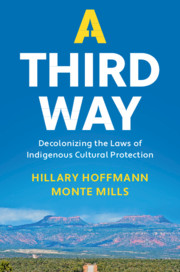Book contents
- A Third Way
- A Third Way
- Copyright page
- Dedication
- Contents
- Figures
- Preface
- Acknowledgments
- Introduction
- 1 Legal History and Foundations
- 2 The Jurisdictional Framework of the Second Way and the Cherokee Diaspora
- 3 Religious Freedom, the Value of Sacred Places, and the Price of Cultural Ignorance
- 4 Clashing Values, the Blackfeet, and a Measure of Success in the Badger-Two Medicine
- 5 Federal Cultural Protection Statutes
- 6 Tribal Laws
- 7 Both Ends of the Spectrum and Everything in Between
- 8 Indigenous Cultures and Intellectual Property
- 9 A Third Way for the Future
- Index
1 - Legal History and Foundations
Published online by Cambridge University Press: 16 July 2020
- A Third Way
- A Third Way
- Copyright page
- Dedication
- Contents
- Figures
- Preface
- Acknowledgments
- Introduction
- 1 Legal History and Foundations
- 2 The Jurisdictional Framework of the Second Way and the Cherokee Diaspora
- 3 Religious Freedom, the Value of Sacred Places, and the Price of Cultural Ignorance
- 4 Clashing Values, the Blackfeet, and a Measure of Success in the Badger-Two Medicine
- 5 Federal Cultural Protection Statutes
- 6 Tribal Laws
- 7 Both Ends of the Spectrum and Everything in Between
- 8 Indigenous Cultures and Intellectual Property
- 9 A Third Way for the Future
- Index
Summary
The story of indigenous cultures in the United States is almost as old as the land itself. By nonindigenous measures, including the anthropological and archaeological records and Western calendars, they are entering at least their tenth millennium. Despite facing ongoing destructive external forces, particularly over the last 500 years, many of these cultures have witnessed thousands of years of evolution on the North American continent. But viewing these cultures by such scientific standards ignores the depth of their connection to the continent, a depth that is reflected in the oral histories passed down by generations of indigenous people. These histories stretch back to what many indigenous people call “time immemorial,” or the beginning of time, and tell of the first moments of the planet’s existence, the birth of humankind, and the peopling of the land. These stories are central to many aspects of indigenous culture and spirituality in the same way that sacred texts like the Bible or the Quran are central to Christianity or Islam. Unlike those texts, though, these oral traditions and stories, passed down over centuries, evolve with time and collective experience, and they continue to inform the core cultural beliefs and values of many tribes.
- Type
- Chapter
- Information
- A Third WayDecolonizing the Laws of Indigenous Cultural Protection, pp. 7 - 21Publisher: Cambridge University PressPrint publication year: 2020



